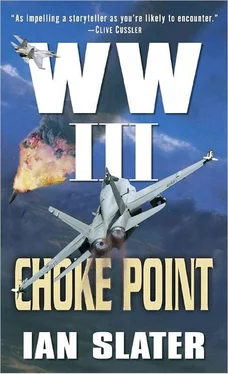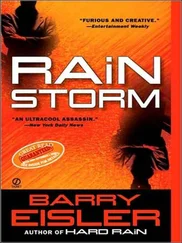With a fuel-guzzling “dash” speed of 35 knots, the Skate ’s estimated time of interdiction with the ferry was fourteen minutes, at a point plus or minus three miles from Keystone. The Skate ’s captain and third officer, their binoculars glued to them, devoutly hoped that there would be no more “floaters,” whom they’d feel they should stop to pick up. The best the Skate ’s skipper could do, similar to what Frank Hall had done on Petrel , was to have one of their two inflatables ready with a paramedic and three other able seamen standing by.
“Anything, lookouts?” called the captain.
“No, sir,” came the answer from starboard and port. “Just a lot o’ dead fish. They smell somethin’—”
“Very good. Keep sharp.”
“Twelve minutes fourteen seconds till ETI,” responded the third mate.
“Very good.”
By now the Skate ’s radio officer, like Jensen’s Marine guard contingent, was trying unsuccessfully to make contact with the ferry. No response.
“Something’s wrong,” opined the patrol ship’s mate. “Twelve minutes ETI.”
Every skipper in the Northwest was on edge, to put it mildly, and the Skate ’s captain sounded Action Stations.
Suddenly the ship came alive with dozens of crew who only minutes before had been comfortably in the rhythm of their watch. They were now running along with off-watch personnel, pulling on helmets and flak jackets, manning their stations from the stern’s Mk 38 gun and Stinger launcher pedestal to the ship’s two.50 caliber machine guns, its two 7.6mm machine guns, grenade launchers, and, up forward, another Mk 38 25mm chain gun.
Yet despite all this armament, many of the Skate ’s crew felt uncomfortably vulnerable. The 170-foot-long, twenty-five-foot-wide ship was, in their view, grossly undergunned for its size, and presented a big enough target for surface-to-surface or air-launched missiles of the kind that had killed the night watchman at Cherry Point and set the whole complex ablaze.
“Don’t sweat it,” a petty officer assured the young chain gunner. “It’s only a friggin’ ferry we’re coming to. People and cars, ol’ buddy. That’s all.”
“Yeah, but what nut would take a ferry out when there’s a midget sub still around?” He was thinking of the Canadian ferry Georgia Queen .
The petty officer shrugged. “Ah, he’s probably taking stores over for Whidbey’s Naval Air Station.”
“Without an escort? Gimme a break!”
“ETI nine minutes thirty seconds,” the captain’s voice boomed out. “Stay focused. Stay alert. ROE — no firing unless I give the word. I say again, no firing unless I give the word.”
“Yeah yeah,” said one of the gunners. “I get it.” But the captain would repeat his order, knowing that, given the ongoing trauma of the past few days, everyone was on edge. No one on Skate had been sleeping well. It was also a common complaint ashore.
“ETI nine minutes.”
When Wu Ling heard the knock on her door in Beijing’s Haidan District, it was near midnight, and she feared it was the Gong An Bu. Instead it was a neighbor, an elderly woman who had lost a son in the fighting against the terrorists in Kazakhstan. A member of the PLA Corrections Service, she came to Wu Ling in civilian clothes and gave her a well-worn postcard. The card, Wu Ling thought, looked as if it had been carried around for some time, an assumption borne out by the fact it had been postmarked two weeks earlier. Wu Ling gave the uninspiring picture of one of the Forbidden City’s 9,999 rooms only a cursory glance.
The corrections officer left quickly, disappearing into one of the maze of hutongs.
The note from Chang wasn’t long: twelve lines. He wrote that he was fine, the prison food bad, and the Central Committee blaming him for the setbacks the army was experiencing in Kazakhstan. Li Kuan’s terrorists had more sophisticated weapons than anyone had anticipated. He missed her, but he had friends, “and tell as many of them as you can what’s happened to me.” He was sure his 12th Army and the other PLA divisions would soon regain the offensive, and then they’d have to let him out of jail. He missed her and “bamboo in the wind,” the last a sexual reference to something he’d taught her when she first became his concubine, then his lover.
It was his writing, all right. She made a photocopy and sent it to Charlie Riser, Cultural Attaché, U.S. Embassy, Xiu Shui Bei Jie 3, Chaoyang District, Beijing. Maybe Mandy’s father could use the information to embarrass Beijing and the Nanjing Military District into admitting the ridiculous lie that her lover and protector wasn’t in perpetual conference but was being used as a “scapegoat”—she remembered the word from Mr. Riser — for Beijing’s failures in Kazakhstan. She wasn’t a fool — she also sent copies of the postcard, in good quality, opaque envelopes, to those who were still General Chang’s friends in the Politburo.
Riser took his copy straight to the military attaché, Bill Heinz. “Bill, I knew they were lying,” he said. “Look at this.”
Heinz didn’t immediately look, preoccupied as he was with the two-China war. It still wasn’t possible to nail it down — who’d actually started it. Not that it mattered now that the typhoon’s atrocious weather put pay to the idea of any ChiCom invasion of Taiwan, at least for the foreseeable future. But Beijing now had a foothold on Penghu as well as Matsu, a fact that for now the United States, preoccupied as it was with the catastrophe in its own waters, wasn’t disposed to remedy. The home front had priority.
Finally he looked at Riser’s copy of the postcard sent to Wu Ling. “So?”
“Well, it proves I was right. Chang is in jail. And if I can see him — I mean he talks about Li Kuan being in Kazakhstan — and get more details about—”
“You want me to use my connections to find out what prison he’s in.”
“Yes.”
“We’ve got to use our informants sparingly, Charlie. It’s like capital. You can’t spend it on—”
“You think it’s frivolous?”
“No, no, no. Hell, no. But right now we’ve just had a war across the strait.”
“Which one?”
“Exactly. I’ve got orders from Washington to spend 24/7 on future PRC-ROC relations. Nothing else.”
“You won’t help?”
“Of course I will, Charlie; but it’s gonna have to be on the fly. Can’t promise more than that. I can ask questions about Kazakhstan.” There was an awkward pause. He knew Riser was still hurting over Mandy, but Riser would always be hurting, and the reality was, Riser would never see Li Kuan. Never get near him.
“I’ll ask questions,” he told Riser. “Something might come up.”
But Riser could tell his embassy colleague held no hope, and the truth was, despite his own resolve to see Li Kuan brought to justice, he felt hopeless too.
“Eti three minutes,” advised the Skate ’s third mate.
The Port Townsend — Keystone ferry was five miles from the Keystone dock. “Still no radio response, Admiral,” Skate ’s captain reported to Jensen. “We’re going to siglamp.”
“Very well.”
Only a handful of Skate ’s thirty-five officers and crew had ever seen a signal lamp in action, the brisk, sharp, louvered flashes of light in Morse alien and amusingly old-fashioned in their nanotech computer age. Still, a young able seaman who’d volunteered for the course in signal lamp communication — or “dinosaur blinking,” as it was derisively referred to by Navy nerds — suddenly found himself the center of attention on Skate . If the ferry skipper — they were almost always retired Coast Guard captains — understood the “dinosaur blinker” and hove to as he was being ordered, it might prevent some ugly stuff.
Читать дальше












